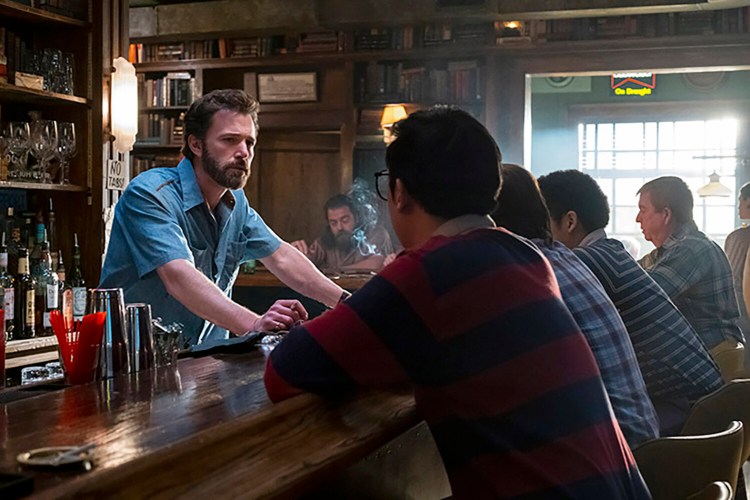The title of George Clooney’s warm and fuzzy film adaptation of J.R. Moehringer’s best-selling 2005 memoir involves a bit of clever wordplay.
First, “The Tender Bar” is an affectionate allusion to the place where much of the film’s action takes place, if action is the right word for a story that’s mostly about words and feelings: a tavern in working-class Manhasset, Long Island, named the Dickens, after the English writer. But it’s also an inversion of “bartender,” which is only one thing you might call the character of Moehringer’s Uncle Charlie, played by Ben Affleck, a bookish autodidact and dispenser of both shots (to the bar’s friendly regulars) and avuncular wisdom – which he calls the “male sciences” – to his nephew, played by Daniel Ranieri at age 11, and Tye Sheridan as a young adult.
Tender also is an apt description for the gently heartwarming tone of this appealingly low-key, faded Kodachrome coming-of-age story, capably directed by Clooney from a screenplay by William Monahan (“The Departed”).
Nothing especially momentous occurs in this film, which opens in 1973 with the relocation of Ranieri’s J.R and his mother (Lily Rabe) to the crowded and noisy house in which she grew up after being abandoned by the boy’s father (Max Martini) – a deadbeat drunk and radio DJ known as the Voice – who gave his real name to J.R. but little else. (A running joke in the film is that J.R. stands for junior.) It’s J.R.’s story, but the figure who looms largest is Charlie, a surrogate father and all-around mensch for a boy who has no other male role model.
When Mom apologizes to J.R. for their boisterous new living conditions – a houseful of aunts, uncles and cousins all living under the grudging wing of J.R.’s crotchety, flatulent grandfather (Christopher Lloyd) – the kid reports that he doesn’t mind. “I like it,” he says. “It’s people. I like to have people.”
So what happens, in a tale that spans a decade or so, from J.R.’s earliest discovery of literature (courtesy of Charlie and a closet whose sagging shelves are filled with books) to J.R’s college years at Yale, and a first job in journalism? Oh, there’s a first love (with an unattainable classmate, played by Briana Middleton); a broken heart; a health scare when Mom develops a tumor; and some drinking that briefly threatens to become a problem for its young protagonist. (This is, perhaps, to be expected in a movie that is largely set in a bar.)
But for the most part, life’s darker shadows are kept comfortably at bay, including J.R.’s daddy issues with his actual, albeit absentee father. There is one scene, late in the film, in which J.R. delivers some comeuppance, telling his old man – aptly, given his father’s radio nickname – “Shut the (expletive) up!”
Clooney and Monahan employ a form of understated storytelling: The film sneaks up on you, like a sweet cocktail in which you can’t taste the alcohol, delivering a powerful yet unexpected punch. A big ingredient is Affleck, whose performance strikes just the right notes of practical advice and deep affection. At times, Charlie’s role in the story feels a bit literary, for lack of a better word: contrived and on-the-nose. And yet the film acknowledges this: “Maybe this is the point where you tell me something really important,” J.R. says to Charlie – at a moment in the narrative when one would expect such a message. (“Lighten up on your drinking,” Charlie says, a bit anticlimactically.)
If “The Tender Bar” is about anything, it’s familial love, not life lessons. If it feels smart, and it does, it’s a kind of emotional intelligence. Love – of people, of storytelling, of being alive – is its slyly intoxicating theme.
Send questions/comments to the editors.




Success. Please wait for the page to reload. If the page does not reload within 5 seconds, please refresh the page.
Enter your email and password to access comments.
Hi, to comment on stories you must . This profile is in addition to your subscription and website login.
Already have a commenting profile? .
Invalid username/password.
Please check your email to confirm and complete your registration.
Only subscribers are eligible to post comments. Please subscribe or login first for digital access. Here’s why.
Use the form below to reset your password. When you've submitted your account email, we will send an email with a reset code.